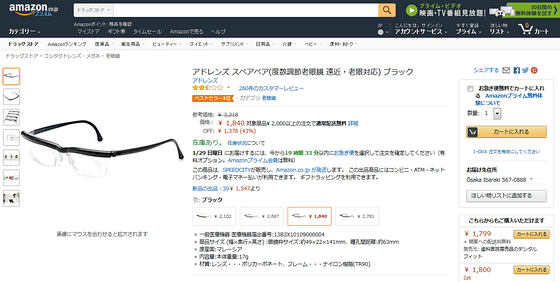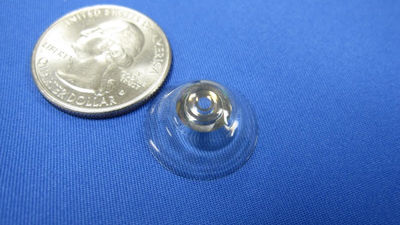Smart glasses that automatically focus on according to what you see

Besides fixed ones for glasses of glasses, there are "bifocal lens" and "progressive lens" of bifocal lenses. Because these lenses have different degrees of lenses on one sheet, the viewpoint of things is different from ordinary glasses, it takes time to get used to, but only by wearing something, the eyeglasses will automatically Innovative eyeglasses using liquid-based special lenses are developed that will focus on.
I can see clearly now | UNews
http://unews.utah.edu/i-can-see-clearly-now/
These glasses come with lenses that adjust themselves
http://mashable.com/2017/01/25/glasses-liquid-lens/
It is an engineering team including Professor Carlos Mastrastero of Utah University's Electricity and Computer Engineering Department to develop smart glasses that automatically focus on what the wearer is seeing. "Liquid glycerin" which is commonly used for humectants and beauty products is used for lenses, and both sides of the lens are covered with a flexible rubber film. Three actuators are connected to the rubber film on the back side, and a mechanism that adjusts the refractive index of light of the lens by moving the rubber film back and forth.

In addition, smart glasses have a built-in range finder and measure the distance to the object weare seeing with infrared rays. By transmitting the perspective of the object to the actuator by the range finder, the lens deforms just by looking at the object, and it automatically focuses. Also equipped with Bluetooth connection function, when using for the first time it is necessary to adjust the eyes and lens of the wearer only once from the dedicated application.

The prototype of this smart glasses was also exhibited at CES 2017, but at this stage the glasses' borders are very thick and neck with designs that are much more common fashionable eyeglasses. Professor Mastrakuro also says that "To make a sale it must be thinner and attractive glasses." Smart smart glasses developed do not need to be replaced even if their eyes get bad, but it is also true that people wearing eyeglasses sometimes replace eyeglasses due to "fashionability". On the other hand, smart glasses with batteries and special lenses mean that they will be more expensive than normal glasses.

Utah University's engineering team says to release a product version with a design like usual glasses within 3 years. People who use bifocal glasses and the like tend to have a higher age group, but lenses already functionally problematic have already been completed, so even if they sell smart glasses as thick thick frames, they care about the design Mashable anticipates that there will be a demand from the non-layer.
In addition, eyeglasses that can adjust the power manually have been sold in Japan for a long time, and it looks like a normal eyewear design.
Amazon.co.jp: Adren's spare pair (Frequency control reading glasses perspective / presbyopic correspondence) Black: Drug store

Related Posts:
in Hardware, Posted by darkhorse_log







